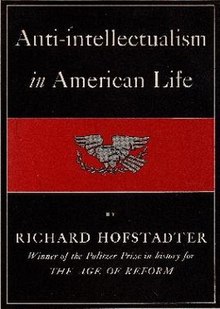Anti-intellectualism in American Life
This article includes a list of general references, but it lacks sufficient corresponding inline citations. (January 2013) |
 First edition | |
| Author | Richard Hofstadter |
|---|---|
| Country | United States |
| Subject | Intellectualism |
| Publisher | Knopf |
Publication date | 1963 |
| Pages | 434 |
| Awards | Pulitzer Prize for General Non-Fiction (1964) |
| OCLC | 227012080 |
Anti-intellectualism in American Life is a book by Richard Hofstadter published in 1963 that won the 1964 Pulitzer Prize for General Non-Fiction. In this book, Hofstadter set out to trace the social movements that altered the role of intellect in American society. In so doing, he explored questions regarding the purpose of education and whether the democratization of education altered that purpose and reshaped its form. In considering the historic tension between access to education and excellence in education, Hofstadter argued that both anti-intellectualism and utilitarianism were consequences, in part, of the democratization of knowledge. Moreover, he saw these themes as historically embedded in America's national fabric, an outcome of its colonial European and evangelical Protestant heritage. He contended that American Protestantism's anti-intellectual tradition valued the spirit over intellectual rigour.[1] He also noted that Catholicism could have been expected to add a distinctive leaven to the intellectual dialogue, but American Catholicism lacked intellectual culture, due to its failure to develop an intellectual tradition or produce its own strong class of intellectuals.
References
- De Simone, Deborah M. "The Consequences of Democratizing Knowledge: Reconsidering Richard Hofstadter and the History of Education." The History Teacher. Vol. 34, No. 3 (May 2001).
- Lemann, Nicholas. "The Tea Party is timeless." Columbia Journalism Review Online edition: September 2, 2014. — This story was published in the September/October 2014 issue of CJR with the headline, "The American way."
- Specific
- ^ Shields, Jon A. (2009-02-02). The Democratic Virtues of the Christian Right. ISBN 1400830109.
External links
- Anti-intellectualism in American Life at Open Library
- Cook, Ramsay (Winter 1963–1964). "Review of Anti-Intellectualism in American Life by Richard Hofstadter". International Journal. 19 (1): 98–99. doi:10.2307/40198709. JSTOR 40198709.
{{cite journal}}: Invalid|ref=harv(help)
